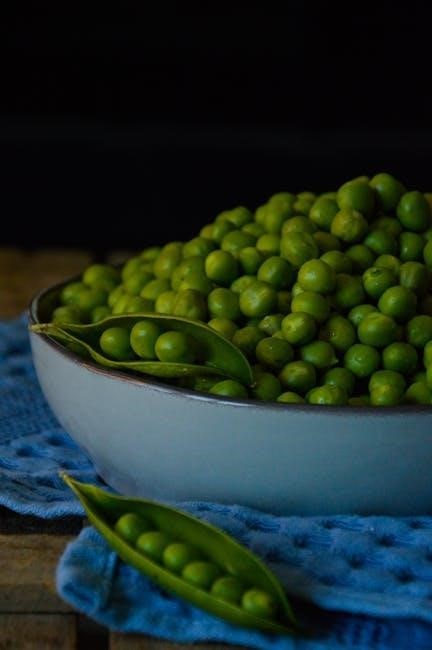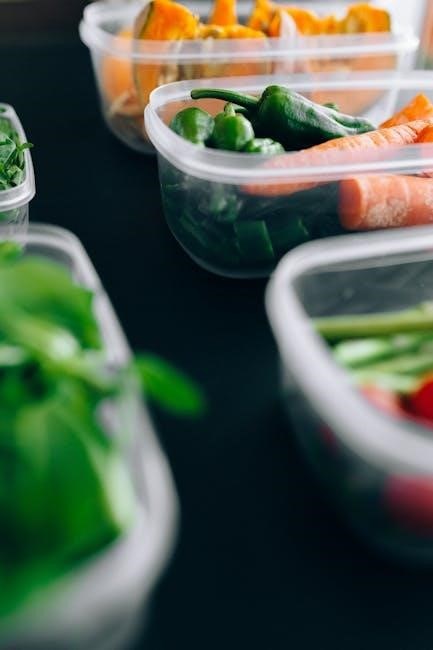
30-day plant-based diet plan pdf
Embark on a transformative journey with a 30-day plant-based diet plan, designed to guide you toward a healthier, more sustainable lifestyle. Discover delicious meal ideas, nutritional benefits, and practical tips to help you thrive on a plant-powered diet. This structured plan offers a seamless transition to whole, nutrient-rich foods, promoting overall well-being and environmental consciousness.
Understanding the Basics of Plant-Based Eating
Plant-based eating focuses on whole, minimally processed foods like fruits, vegetables, legumes, whole grains, nuts, and seeds. It emphasizes avoiding animal products, though some plans may include dairy or eggs. This approach prioritizes natural nutrients, fiber, and vitamins while reducing reliance on meat and refined foods. Plant-based diets are versatile, catering to various lifestyles, from vegan to flexitarian. They promote sustainability by lowering environmental impact and support overall health by reducing chronic disease risks. Understanding these basics helps create a balanced and satisfying diet, making the 30-day transition smoother and more enjoyable.

Health Benefits of a 30-Day Plant-Based Diet
A 30-day plant-based diet promotes weight loss, improves heart health, and reduces chronic disease risks. It enhances digestion, boosts energy, and supports overall well-being.
How a Plant-Based Diet Can Improve Your Overall Health
A plant-based diet is packed with vitamins, minerals, and antioxidants, which support immune function and reduce inflammation. It lowers cholesterol, blood pressure, and the risk of heart disease. By focusing on whole foods like fruits, vegetables, and legumes, this diet helps maintain a healthy weight and improves digestion. Studies show it reduces the risk of type-2 diabetes and certain cancers. The fiber-rich foods promote gut health, while the absence of processed meats and saturated fats contributes to long-term well-being. Adopting this diet for 30 days can lead to significant improvements in overall health and energy levels.
A Sample Day in the 30-Day Plant-Based Meal Plan
A balanced day includes avocado toast for breakfast, lentil soup for lunch, and quinoa-stuffed peppers for dinner, ensuring variety and nourishment throughout the day.
Breakfast, Lunch, and Dinner Ideas for a Balanced Diet
Start your day with a vibrant berry smoothie or whole-grain toast topped with avocado and tomato. For lunch, opt for a hearty quinoa salad or a veggie wrap filled with hummus and greens. Dinner could feature stuffed bell peppers with rice and beans or a flavorful lentil curry over brown rice. Incorporate a variety of colors and textures, ensuring each meal is nutrient-dense and satisfying. These ideas provide a foundation for balanced eating, keeping you energized and committed to your plant-based journey.

Tips for Successfully Completing the 30-Day Challenge
Plan meals weekly, prep ingredients, and stock whole foods. Stay hydrated, listen to your body, and seek support. Celebrate small wins and embrace the journey!
Practical Advice to Stay on Track with Your Plant-Based Journey
Start by clearing your pantry of non-plant-based foods to avoid temptation. Plan your meals weekly and prep ingredients in advance to save time. Incorporate a variety of whole foods like fruits, vegetables, legumes, and whole grains to ensure nutritional diversity. Stay hydrated by drinking plenty of water throughout the day. Listen to your body and adjust portions as needed. Seek support from online communities or friends who share your dietary goals. Celebrate small victories along the way to stay motivated. Lastly, embrace the journey as a lifestyle change rather than a temporary fix.
Protein Sources in a Plant-Based Diet
Plant-based diets offer abundant protein sources like legumes, lentils, chickpeas, beans, tofu, tempeh, edamame, quinoa, and nuts and seeds, ensuring a variety of options for nutrition.
Ensuring Adequate Protein Intake Without Animal Products
A well-planned plant-based diet provides ample protein by incorporating diverse food sources. Legumes like lentils, chickpeas, and black beans are high in protein and versatile in meals. Whole grains such as quinoa and farro also contribute significant protein. Nuts, seeds, and nut butters, like almonds and chia seeds, offer healthy fats and protein. Tofu, tempeh, and edamame are excellent plant-based protein options. Combining foods, such as whole grains with legumes, enhances protein quality. Plant-based meat alternatives can also be included for variety. By focusing on these options, you can easily meet your daily protein needs while enjoying a balanced diet.
Environmental Impact of a Plant-Based Diet
A plant-based diet significantly reduces greenhouse gas emissions, water usage, and land demand. By choosing plant-based options, you contribute to a healthier planet and sustainable future.
How Your Diet Choices Can Help the Planet
Your dietary choices play a crucial role in protecting the environment. A plant-based diet reduces greenhouse gas emissions, water consumption, and land use significantly compared to animal-based diets. Animal agriculture is a major contributor to deforestation, pollution, and biodiversity loss. By embracing plant-based meals, you directly support sustainable agriculture and conserve natural resources. This shift not only benefits the planet but also promotes a healthier lifestyle. Every plant-based meal choice contributes to a cleaner, greener Earth, making a meaningful impact on climate change and environmental conservation. Start your journey with a 30-day plant-based plan and make a difference.

Meal Prepping for the 30-Day Plant-Based Diet
Meal prepping is a game-changer for staying consistent with your plant-based diet. Plan weekly meals, batch-cook staples, and store leftovers to save time and reduce waste. Organize your fridge and use reusable containers to keep meals fresh and accessible. This strategy ensures you always have healthy, delicious options ready, making it easier to stick to your 30-day plan and enjoy the journey to a plant-powered lifestyle.
Time-Saving Strategies for Delicious and Nutritious Meals
Meal prepping and planning are essential for maintaining a balanced plant-based diet. Start by batch-cooking grains, legumes, and roasting vegetables weekly. Chop fresh ingredients in advance to streamline meal assembly. Prepare dressings, sauces, and marinades ahead of time for quick flavor boosts. Use a grocery list to ensure you have all necessary items. Pack meals in reusable containers for easy grab-and-go options. Incorporate one-pot recipes and sheet pan meals for minimal cleanup. These strategies not only save time but also keep your meals exciting and nutritious throughout your 30-day journey.

Common Challenges and Solutions
Cravings, social pressures, and meal prep challenges are common. Plan ahead, stock plant-based staples, and seek support. Creative substitutes and gradual changes ease the transition smoothly.
Overcoming Obstacles on Your Plant-Based Journey
Navigating a plant-based diet can present challenges, but with the right strategies, success is achievable. Meal prepping and planning ahead help avoid last-minute food decisions. Staying hydrated and incorporating fiber-rich foods can curb cravings. Social pressures may arise, so it’s essential to communicate your dietary choices clearly. Seeking support from like-minded communities or online forums can provide motivation and inspiration; Additionally, exploring creative recipes and flavorful ingredients keeps meals exciting and satisfying. Remember, every small step counts, and consistency is key to long-term success on your plant-based journey.
The Role of Fiber in a Plant-Based Diet
Fiber is a cornerstone of a plant-based diet, promoting digestion and satiety. Whole foods like fruits, vegetables, and legumes provide ample fiber, supporting healthy blood sugar levels and gut health.
Maximizing Nutritional Benefits Through Fiber-Rich Foods
Fiber is a vital component of a plant-based diet, offering numerous health benefits. Foods like beans, lentils, whole grains, and vegetables are rich in dietary fiber, which supports healthy digestion and satiety. Incorporating fiber-rich foods can help lower cholesterol levels, regulate blood sugar, and promote a balanced gut microbiome. Aim to include a variety of colorful fruits, leafy greens, and legumes in your meals to maximize fiber intake. Pairing whole grains with plant-based proteins ensures a nutrient-dense diet. By focusing on whole, unprocessed foods, you can effortlessly meet your daily fiber needs and enhance overall well-being. This approach fosters long-term health benefits and sustainable energy levels.
Weight Loss and the 30-Day Plant-Based Diet
A plant-based diet naturally supports weight loss by focusing on nutrient-dense, low-calorie foods like fruits, vegetables, and whole grains, promoting a healthier, slimmer you.
How a Plant-Based Diet Can Support Your Weight Loss Goals
A plant-based diet is an effective way to achieve weight loss by focusing on nutrient-dense, low-calorie foods like fruits, vegetables, and whole grains. These foods naturally reduce overall calorie intake while providing essential vitamins, minerals, and fiber, which help maintain satiety and boost metabolism. By eliminating processed foods and animal products, the diet minimizes fat and sugar consumption, promoting a healthier weight. Balanced carbs and proteins from legumes, nuts, and seeds further support energy levels and muscle maintenance. With a structured 30-day meal plan, you can enjoy delicious, portion-controlled meals that keep you full and energized, making sustainable weight loss achievable and enjoyable.
Related Posts

therapy ed book pdf free download
Unlock powerful self-help! Find free therapy workbooks, insightful eBooks, and downloadable PDFs to boost your mental wellbeing. Start your journey today!

no equipment 30-day workout program pdf
Ditch the gym! This free 30-day workout program requires absolutely no equipment. Perfect for home or travel – get stronger & healthier with our easy-to-follow PDF. **No-equipment workout** starts now!

simple sentences for kindergarten to read pdf
Help your little one blossom into a reader! Download free, simple sentences perfect for kindergarteners. Engaging PDFs make learning to read fun & easy! ✨